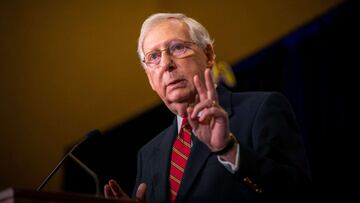Second stimulus check: what has McConnell said about relief package?
As we await news on whether Donald Trump or Joe Biden will be the US president, attention is again turning to what financial support is needed across America.

On the day after the 2020 presidential election, the United States - and much of the world - are still awaiting confirmation on whether Donald Trump will remain in power for another four years or if he'll be replaced by Joe Biden. But while attention is understandably fixed on what is happening around the White House positions, lawmakers returned to work and there are vitally important items on their agenda.
Stimulus checks: McConnell pushes for 'end of year' bill
US Senate Majority Leader Mitch McConnell spoke on Wednesday saying that Congress needed to approve a new coronavirus aid bill by the end of 2020. This comes after months of posturing ahead of the election.
- US Election Day 2020: live updates
- USA election 2020 results map by state
- How will mail voting affect the election result?
- Which swing states have Trump and Biden won?
- Who did Nostradamus predict would win the 2020 USA elections?
Saying he hoped that partisanship over such a stimulus bill will subside with voting for president and members of Congress over, McConnell said there was a 'need to do it by the end of the year.' He also noted the 'possibility' that such a bill 'will do more for state and local governments,' a key Democratic demand. On 30 October, McConnell said in an interview with conservative radio show host Hugh Hewitt that such an aid bill should be done at the beginning of 2021.
Senate Majority Leader McConnell on the possibility of a new Covid-19 relief package: "I think we need to do it, and I think we need to do it before the end of the year." pic.twitter.com/jNMXYNnWsU
— MSNBC (@MSNBC) November 4, 2020
Related stories
McConnell, the top Republican in Congress, did not say why he was now accelerating that timetable. 'I think that's job-one when we get back, hopefully with a more cooperative situation than we had,' before the election, McConnell said. He added that another top priority of Congress' work session that begins next week and could extend well into December is passage of legislation to fund government functions beyond 11 December, when existing money expires.
- How will the presidential election affect unemployment benefits in US?
- How could the election affect a new round of second stimulus checks?
- Second stimulus check: US coronavirus relief bill update
House of Representatives Speaker Nancy Pelosi is seeking a comprehensive coronavirus aid bill of at least $2.2 trillion. But the Senate's Republican majority balked and before the election that chamber did not even pass a pared-down $500 billion measure.

